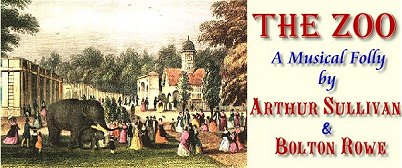The Zoo, which has a score by Sullivan and a libretto by
Bolton Rowe (pseudonym of B.C. Stephenson), was first performed
on June 5, 1875, a few weeks after
Trial By Jury opened; it was
produced as an afterpiece to Gilbert's farce
Tom Cobb. Like
Trial by Jury, The Zoo is a one-act piece without spoken
dialogue.
The major characters are: Aesculapius Carboy, an
impecunious apothecary; Laetitia, whom Carboy wants to marry; Mr.
Grinder, Laetitia's father; Eliza Smith, who runs the Refreshment
Stall of the London Zoological Gardens; and Thomas Brown, Eliza's
suitor, a man with a secret.
As the curtain opens, some "Ladies and Gentlemen of the
British Public" (a.k.a. the chorus) are visiting the zoo's Bear
Pit and Refreshment Stall, and (of course) singing. They finally
notice that a young man, Aesculapius Carboy, is trying to hang
himself on the veranda of the Refreshment Stall. They have no
objection to his doing so, but want to know why: "Is it your
wife?" Carboy explains that the father of Laetitia Grinder, the
woman he loves, has rejected him because he is a mere apothecary.
Now a further problem has arisen: he simultaneous sent Laetitia
a dose of peppermint (the lovers communicate through
prescriptions) and her father a medication not to be taken
internally--and apparently the labels got mixed up.
Eliza Smith, who is in charge of the Refreshment Stall,
orders Carboy to desist (after all, it would probably hurt
business if his corpse were dangling from her stall). Thomas
Brown, who has been wooing Eliza, suspects that Carboy is a
rival, but she reassures him.
Laetitia arrives in search of Carboy; it seems that her
sister sent the message about the mix-up of labels as a joke.
The two sing a duet of rapturous reunion, as Eliza and Thomas
Brown sing their own duet in counterpoint--a patter-song about
all the refreshments Thomas has been consuming while handing
around Eliza's stall. Then Thomas collapses; Carboy, as an
apothecary, insists that he must not be crowded or moved, so the
chorus crown around Thomas and try to move him, while offering a
multitude of conflicting second opinions. Finally Thomas comes
to and announces weakly: "It was the last bun." Carboy sends
Eliza off to get a prescription for him. Then, continuing his
medical examination of Thomas, he discovers the Order of the
Garter beneath his coat and diagnoses that "he's a peer in
disguise." Thomas, recovering, admits this and explains that he
has come here incognito "in search of virtue" and found it in
Eliza. He goes off to change his costume.
Laetitia's father, Mr Grinder, now appears, in search of "my
wicked daughter" and carboy. He rebukes them, calling her
"Heartless undutiful child" and him "Vilest Compounder of
potions." They (and the chorus) try to appeal to Grinder's finer
feelings, but unfortunately he doesn't seem to have any. So
Carboy again resolves on suicide and sings "Fetch me a rope!"
The chorus, ever helpful, provides him with one. Carboy sings a
touching farewell to Laetitia, and uses the rope to lower himself
into the Bear Pit.
At this dramatic moment, Thomas Brown--actually the Duke of
Islington--returns in all his ducal splendor and reveals his True
Identity to Eliza, asking her to marry him. She is reluctant to
leave "the beasts I loved so well," distraught at the thought
that without her and her refreshments, the grizzly bears and
other animals might not be fed. But Thomas, truly a Sensitive
Male before his time, reassures her: he has bought all the
animals, apparently as a wedding present, and the baboon,
raccoon, and so on will accompany them. As he tenderly sings:
- Every morn, at early dawn, the gentle armadillo,
Or rattlesnake, when you awake, you'll find upon your
pillow.
Eliza is touched by his thoughtfulness. As they sing of their
happiness (accompanied by the chorus), Carboy's voice is heard
from the Bear Pit. ("Great Heavens! I had forgotten, " remarks
Laetitia.) Carboy reemerges from the Bear Pit, and the chorus is
annoyed at his arousing their sympathy and then not dying. He
explains that the bears seem to have been moved, but, instead, he
will "try the lion's den." Thomas, however, moved by his
devotion, has come to a financial arrangement with Grinder to
obtain his permission for Laetitia's marriage to Carboy, and
gives the two of them "double the amount"--ten thousand a year.
So all prepare for a future of joy unbounded (with wealth
surrounded) as the curtain falls.
This article appeared in Issue 42 (May 1995) of Precious
Nonsense, the newsletter of the Midwestern Gilbert & Sullivan
Society. Posted by permission of Sarah Cole, Society
Secretary/Archivist. For information on Society membership write
to: The Midwestern Gilbert & Sullivan Society, c/o Miss Sarah
Cole, 613 W. State St., North Aurora, IL 60542-1538.

